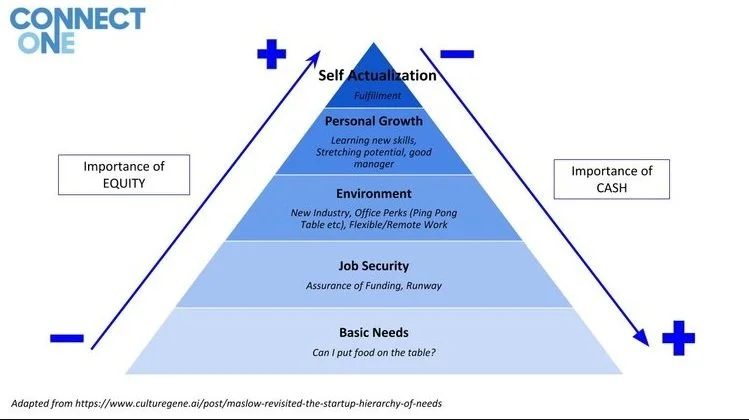Cash or Equity: a view from Southeast Asia
Why do candidates in Southeast Asia prefer cash to equity?
If they’re so focussed on cash, doesn’t that mean they’re risk averse and unsuited to startups?
Not so fast.
We’re a long way from Silicon Valley.
While we’re all super-excited about technology innovations and disruptive business models, our start-up ecosystem and employee marketplace is barely 5 years’ old in most places.
We haven’t seen that many (if any) exits and most employee mindsets are simply not tuned to the upside of equity.
Plus Asia is a big place. With a wide spectrum of socio-economic needs.
Your star talent is likely to be motivated by completely different things depending on whether they grew up in Saigon, Surabaya or Singapore.
So, we encourage founders we work with to think about compensation in the light of Maslow’s Hierarchy of Needs – modified for startups.
Firstly, let’s talk basic needs. Check how much your future employee needs to pay for food on the table and a roof over their head. If they have kids and parents to support, they are simply going to require more cash upfront. Equity won’t pay for tonight’s dinner or tomorrow’s school fees.
Secondly, mindsets. Many exciting markets e.g. Vietnam or Myanmar have only recently emerged from decades of unrest. Which creates a pragmatic mindset of “let’s make hay (or gather rice) while the sun shines” If candidates are taking on the risk of working for a startup, they are likely to prefer cash. Those with more access to safety nets e.g family wealth or social welfare, will be more inclined to taking on equity.
So, the bottom line is that you will have to pay some cash. The quantum will depend on the marketplace, inflation, socio-economic factors and how badly you need that star candidate on your team!
#auntyrocksstartups
#startuplife
#startupcompensation
Author: Joanna Yeoh, ConnectOne Director
Joanna is a Strategic HR and Talent Management practitioner with over 20 years of consulting and corporate HR experience. She thrives on the adrenaline rush that comes from partnering business leaders to build high-performing teams in organisations experiencing hyper-growth and transformation.


